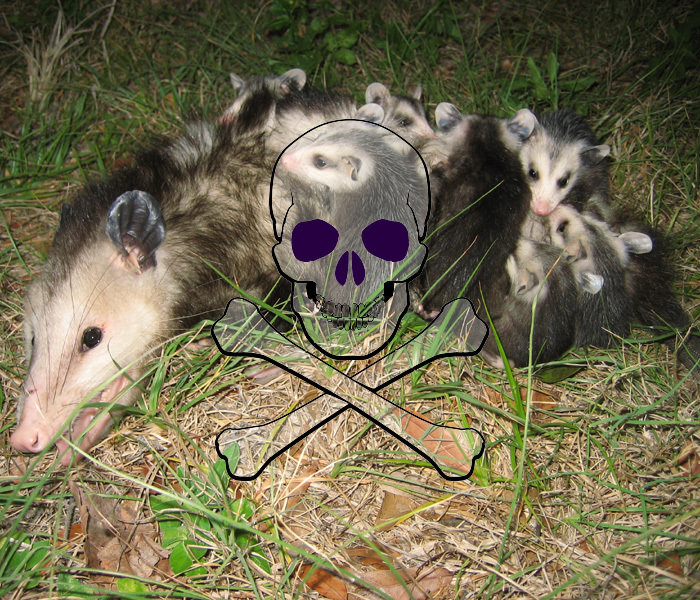- USA Opossum Removal Education Guide and Resources
Opossum Poison - Does it Work? Is it Legal?

Take a look at the practical reasons behind NOT wanting to use poison:
- Firstly, you don’t know where your dead opossum will end up. There have been so many reports of wildlife experts having to cut through dry wall, scramble around in insulation in the attic, and even dig beneath homes to track down a dead creature that makes the ENTIRE house stink. This is all because of DIY poison jobs. At least with a kill trap you know where the animal is!
- Do you really want to deal with a dead creature? You are going to have to dispose of this animal once you track it down!
- You could kill off other forms of wildlife that you would actually want in your yard. This could be birds, your household pets, such as the family cat or dog, and even other pets in the community, should they accidentally come across the poison.
- Sticking with the same theme – poison is an incredibly dangerous option if you have small children.
- With rat poison, a rat will die in about two or three days. If you use rat poison, or even “opossum” poison, it can take several weeks for the animal to die. Would you want to be dying for this long?
- The poison will cause nasty effects to the animal, especially with anticoagulant rat poisons that cause things such as anemia, blood loss and even internal bleeding – these all amount to a very long and very painful death.
And then there's the matter of the law. There are no legally registered opossum poisons on the market for sale, and it is not legal to kill a possum this way. Also, I should point out that these animals are very resilient, and most poisons won't be effective anyway.
Go back to the main Opossum Removal page for more information about Opossum Poison.
Will Warfarin kill a possum? Warfarin is a common ingredient in many rat poisons, and although effective fairly quickly in rats, it can take much longer with a possum, and in some cases, may not even cause death at all. Before we look at whether or not Warfarin will kill a possum, you should first understand what the ingredient actually does. It is an anticoagulant, commonly found in medication given to humans for blood thinning properties, such as those that have suffered with DVT, or Deep Vein Thrombosis. It works by thinning the blood to stop clotting, hence the anticoagulant name. When the poison is consumer, it is absorbed by the body and will travel all the way down to the liver, which is where it will get to work. The synthesis of clotting factors that are dependent on Vitamin K will be interfered with, which means that when the animal gets hurt and starts to bleed, it will not stop or clot, causing it to essentially bleed out. It could also suffer with internal bleeding, or other medical conditions associated with anemia which, as you can imagine, are not pleasant. So, getting down to the “nitty-gritty”, will Warfarin kill a possum? The answer is, when enough poison is used – yes. However, when it does, it will take much longer than what it would take to kill a smaller animal, such as a rat for example, and may take any period of time ranging from one week to four. Also, you have the concern of where the animal will actually die, and the problems resulting from secondary poisoning with other wild animals and pets – all in all, it makes for a rather difficult journey.

